When did Boris Johnson become Prime Minister? Election, key moments and timeline of premiership explained
and live on Freeview channel 276
Liz Truss has just been announced as the new Prime Minister of the United Kingdom, beating her opponent Rishi Sunak after a lengthy Tory leadership race.
The two have been battling it out over the past five weeks as they put forward their bids to replace Boris Johnson, who resigned from office on 7 July.
Advertisement
Hide AdAdvertisement
Hide AdThis came after the former Prime Minister’s handling of the Chris Pincher scandal, which prompted a series of resignations from members of his Cabinet - led by Mr Sunak and Sajid Javid.
But how long was the Uxbridge and and South Ruislip MP in power, and what are the key moments from his time as Prime Minister?
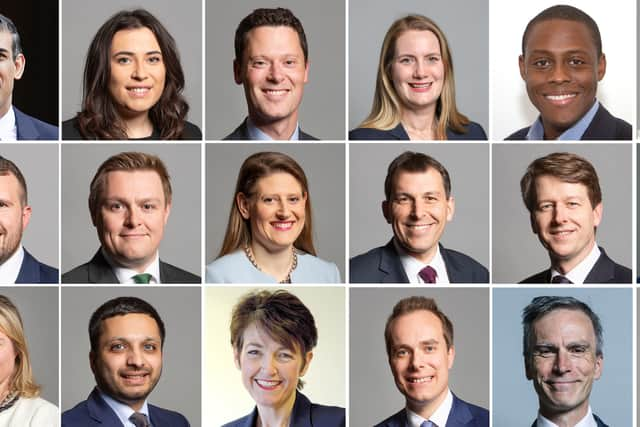

When did Boris Johnson become Prime Minister?
Mr Johnson’s term as Prime Minister began on 24 July 2019, after the resignation of Theresa May.
He became PM when he won the Conservative Party leadership contest, in which he faced off against former Health Secretary Jeremy Hunt.
Advertisement
Hide AdAdvertisement
Hide AdThe Prime Minister later strengthened his position by holding a snap election in December 2019, where the Conservatives received a landslide majority of 80 seats.
This means Mr Johnson has been PM for nearly three years, with the next election not due until 2024.
Who was Prime Minister before Boris Johnson?
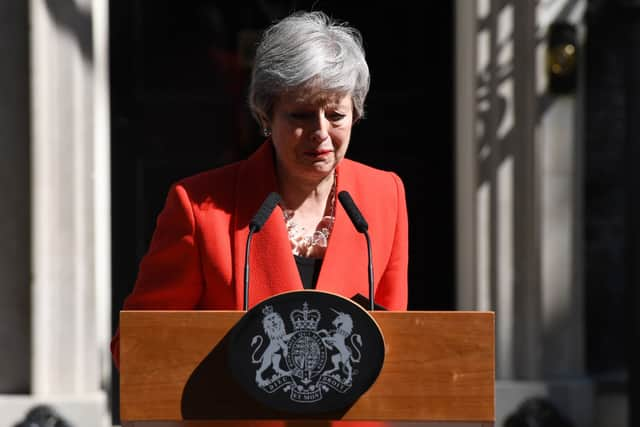

Mr Johnson succeeded Mrs May, who resigned as Prime Minister after just over three years in office, when she failed three times to get her Brexit deal through Parliament.
Prior to Mrs May, David Cameron was Prime Minister from May 2010 to July 2016.
Advertisement
Hide AdAdvertisement
Hide AdHis tenure came to an end when he resigned from office following the results of the 2016 Brexit Referendum.
Mr Cameron initially formed a coalition with the Liberal Democrats’ leader Nick Clegg, before the Conservative Party won a majority at the 2015 general election and re-gained power.
Mr Cameron followed a period of 13 years of Labour government, during which Gordon Brown and Tony Blair were Prime Ministers - for three and 10 years respectively.
What are the key moments from Boris Johnson’s premiership?
August, 2019 - Proroguing of UK Parliament
One of Mr Johnson’s first acts as PM was asking the Queen to prorogue Parliament for a period of five weeks, so that he could pass his Brexit deal.
Advertisement
Hide AdAdvertisement
Hide AdThis decision was widely condemned by both MPs and the general public, with the Prime Minister’s request later ruled unlawful by the Supreme Court.
December, 2019 - Conservatives win snap election
Mr Johnson beat Labour’s Jeremy Corbyn with an 80-seat majority, the biggest Conservative win since Margaret Thatcher’s 1987 victory.
January, 2020 - UK leaves the EU
Mr Johnson followed through on one of his biggest campaign pledges - to ‘get Brexit done.’ The UK officially ceased to be a member of the European Union on 31 January, 2020.
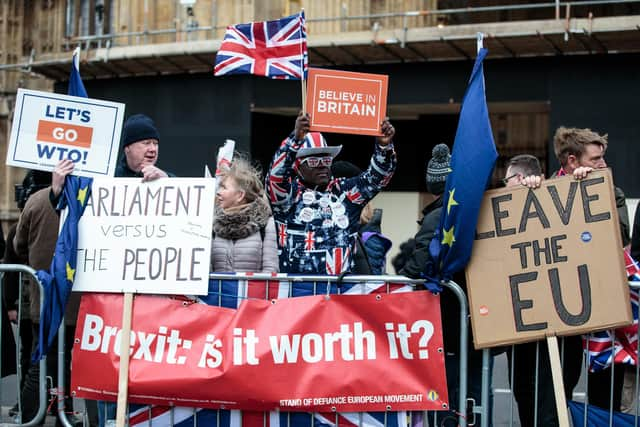

March, 2020 - UK goes into national lockdown
The World Health Organisation declared coronavirus a global pandemic on 11 March. On 23 March, Mr Johnson ordered the UK’s first national lockdown in order to curb the spread of the virus.
May 2020 - Dominic Cummings scandal
Advertisement
Hide AdAdvertisement
Hide AdDominic Cummings sparked mass public outrage when it was revealed he travelled from London to Durham during the UK’s national lockdown, when the government advice was to avoid all but essential travel.
The Prime Minister supported his aide, claiming he considered the matter closed, but in November 2020 Mr Cummings resigned from government.
December, 2020 - Vaccination rollout begins in the UK
Considered by many the biggest success from Mr Johnson’s time as prime minister, the coronavirus vaccination rollout began on 8 December.
Hundreds of millions of vaccinations have since been administered to UK citizens.
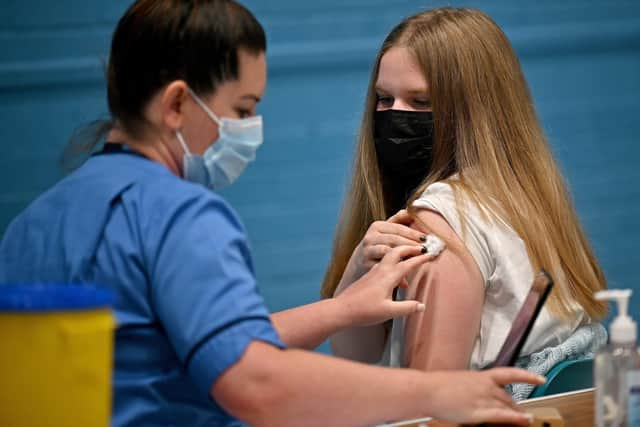

December, 2020 - Christmas is ‘cancelled’
Advertisement
Hide AdAdvertisement
Hide AdJust two weeks later, Mr Johnson introduced a ‘tiered’ coronavirus restriction system across the country.
Millions of Londoners and people living in the South and South East were placed in Tier 4, ruining hopes of a Christmas with loved ones after nearly a year in lockdown.
March, 2021 - Lockdown ends
In March 2021, Mr Johnson announced the beginning of a phased exit from lockdown.
Over the coming months, children and students returned to face-to-face education, restaurants, pubs, and non-essential shops reopened, and legal limits on social contact were ended.
June, 2021 - Matt Hancock resigns
Advertisement
Hide AdAdvertisement
Hide AdOn June 27, Matt Hancock resigned as Health Secretary after his affair with married aide Gina Colangelo was exposed via leaked CCTV footage.
The footage was from 6 May, when no indoor mixing between different households was allowed.
November, 2021 - Partygate scandal
The media began reporting allegations that government officials attended parties in violation of lockdown rules.
Mr Johnson claims no rules were broken, but on 8 December authorised an investigation into the scandal.
March, 2022 - Cost of living crisis
Advertisement
Hide AdAdvertisement
Hide AdThe Government announced a mid-year spending plan which was widely criticised for doing too little to help those struggling with the cost of living.
April, 2022 - UK provides aid to Ukraine
The PM met with Ukrainian President Volodymyr Zelensky in Kyiv, pledging a new package of military and economic support.
April, 2022 - The PM is fined for Partygate
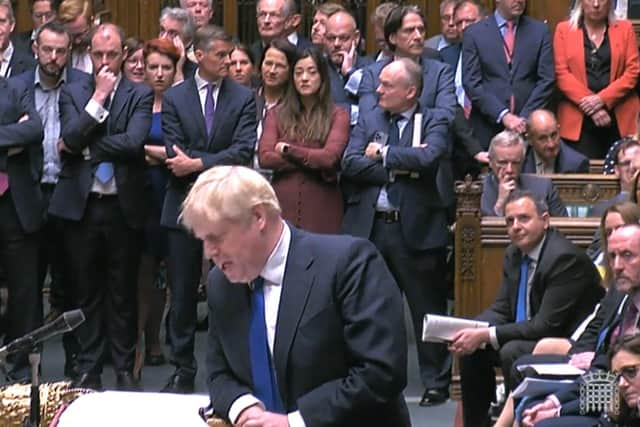

Mr Johnson was fined £50 for attending one of the lockdown parties. He apologised but insisted he was not aware he was breaking the rules.
In May, the full findings of the Partygate investigation were published, detailing 16 gatherings which took place in and around Downing Street between May 2020 and April 2021.
June, 2022 - Johnson wins ‘No Confidence’ vote
Advertisement
Hide AdAdvertisement
Hide AdThe PM won the vote of no confidence by 211 to 148, a far smaller margin than he had hoped for.
July, 2022 - Resignations begin
Mr Johnson is hit by a series of resignations, led by Rishi Sunak and Sajid David, over his handling of the Chris Pincher scandal.
July, 2022 - The PM resigns from the Conservative Party
Today, 7th July, Mr Johnson is resigning as Conservative Party Leader.
Yesterday, Mr Johnson reportedly told friends: “I’m not going anywhere.”
How did it all end?
Boris Johnson resigned from office on 7 July.
As was the case when Mr Johnson succeeded Theresa May, a leadership contest was held - with Liz Truss announced as the new Tory leader and new Prime Minister today (5 September).
Comment Guidelines
National World encourages reader discussion on our stories. User feedback, insights and back-and-forth exchanges add a rich layer of context to reporting. Please review our Community Guidelines before commenting.
